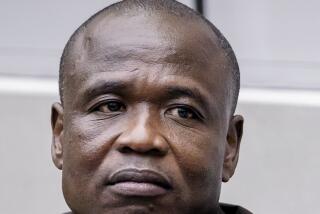Justice for Congo warlord
- Share via
Nobody ever made a viral video about Thomas Lubanga. Unlike Joseph Kony, a similarly despicable African warlord who also recruited child soldiers to carry out a campaign of rape, murder and mutilation and is now the subject of the fastest-spreading video in Internet history, Lubanga’s dirty work went largely unnoticed in the West. Also unlike the still-at-large Kony, Lubanga is about to face justice for his crimes.
Lubanga, the head of a rebel militia that fought a devastating ethnic war in the Democratic Republic of Congo, on Wednesday had the distinction of being the first person convicted by the International Criminal Court, a decade-old institution that has been in equal measures an inspiration and a disappointment for human rights advocates. The guilty verdict is a milestone for the court that also marks the first time an international trial has focused solely on the recruitment of underage soldiers, which is forbidden in global treaties but is usually lumped in with other war-crimes charges. The successful prosecution of Lubanga — for enlisting boys and girls under 15, drugging them, putting them to work killing his enemies and using them as sex slaves — will set a precedent useful in future trials (including a trial of Kony, if he is ever captured).
Child soldiers are more easily brainwashed than adults, and they display a remarkable capacity for brutality when abused. They are also often psychologically scarred for life by the horrors they’re forced to witness and perform. It is the powerful revulsion for this practice that made “Kony 2012,” which at last count had been viewed by more than 100 million people, such an astonishing catalyst for public activism. Critics have attacked Invisible Children, the advocacy group that made the Kony video, for spending most of its donor funds making movies rather than benefiting former child soldiers, but there’s nothing wrong with raising awareness about global atrocities and the monsters who carry them out. We’re less bothered by the spotlight shone on Kony than by the fact that Lubanga has for the most part been able to avoid it.
But he won’t avoid the ICC; he now faces up to life in prison. That answers some of the court’s critics, who have accused it of moving too slowly to accomplish anything. It remains true that the ICC would be more effective if it broadened its focus beyond Africa, but for that to happen, the great powers would have to stop protecting other global villains — such as Syrian President Bashar Assad, who might have been referred to the ICC by now if not for the diplomatic backing of Russia and China — from the long if slow-moving arm of international justice.
More to Read
A cure for the common opinion
Get thought-provoking perspectives with our weekly newsletter.
You may occasionally receive promotional content from the Los Angeles Times.






